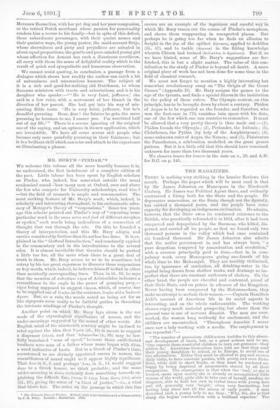MR. BURY'S " PINDAR." 40 WE welcome this volume all the
more heartily because it is, we understand, the first instalment of a complete edition of the poet. Little labour has been spent by English scholars on Pindar, who, indeed, lies somewhat outside the usual academical round—how many men at Oxford, over and above the few who compete for University scholarships, read him ? —but the field of research is ample and remunerative. The most striking feature of Mr. Bury's work, which, indeed, is scholarly and interesting throughout, is his enthusiastic advo- cacy of Metzger's theory of "responsions." Some ten years ago this scholar pointed out Pindar's way of "repeating some particular word in the same verse and foot of different strophes or epodes," such words being indications of a connection of thought that ran through the ode. On this he founded a theory of interpretation, and this Mr. Bury adopts, and carries considerably further than its author has done. It is ex- plained in the" Gerferal Introduction," and constantly applied in the commentary and in the introductions to the several odes. It is almost inevitable that theories should be pushed a little too far, all the more when there is a great deal of truth in them. Mr. Bury seems to us to be sometimes led astray by his too great eagerness to discover these responsions or key-words, which, indeed, he believes himself to find in other than metrically corresponding lines. Thus, in iii., 82, be says that the mention of aigh.opipo:, ai,aa of Aristoelides indicates a resemblance to the eagle in the power of grasping prey,— ?ax being supposed to suggest ai-2,a,aa, which, of course, has to be supplied out of ia CC/3U, in the sentence, faaass T44vpon.4,v Avpco. But, as a rule, the words noted as being set for us like signposts seem really to be faithful guides in threading the intricate windings of Pindar's thought.
Another point on which Mr. Bury lays stress is the use made of the etymological significance of names, and the under-meanings suggested by the sound of other words. An English mind of the nineteenth century might be inclined to rebel against the idea that Ne,wiew (iii., 18) is meant to suggest a dispenser (pi,aw), and that ' Apapnilocci (x„ 65) may be law- fully translated "sans of speed," because these swift-footed brothers were sons of a father whose name began with apacp, a word indicative of haste. Bat to a Greek of Pindar's time, accustomed to see divinely appointed omens ha names, the resemblances of sound might well appear highly significant. That 4/4111 in ii., 8, and perhaps "Aiaa,in ii., 14, would suggest plan,' to a Greek hearer, we think probable ; and. the same under-meaning in cgalTO; certainly does something towards ex- plaining the difficult line, VaE1-041 de Afiyee, ;fuel Awn; Iola; ociPeito (iii., 29), giving the sense of "a blast of justice,"—i.e., a wind that blovis fair. The notes on the passage in which this line Tin Nontoon Odos of Pindar. Elited, with Introdnotions and a Commentary, by J. B. Bury. London : Macmillan. 1890, occurs are an example of the ingenious and careful way in which Mr. Bury traces out the course of Pindar's metaphors, and shows them reappearing in unexpected places. But perhaps he is going too far when he finds an allusion to freight in the 'pp- of the epithet Piprocroc, applied to Achilles (iii., 57), and to tackle (eiptame) in the fitting knowledge wherein Chiron had trained (aeiraaass is apdaisoist). But if, as we have hinted, some of Mr. Bury's suggestions are far- fetched, this is but a slight matter. The value of this con- tribution to the study of Pinder is beyond all doubt. A more original piece of work has not been done for some time in the field of classical research.
We must not forget to mention a highly interesting but somewhat revolutionary essay on "The Origin of the Great Games" (Appendix D). Mr. Bury assigns the games to the age of the tyrants, and finds a special fitness in the institution, to the policy of these rulers. The Olympic contest, on this, principle, has to be brought down by about a century. Phidork of Argos is to be regarded as the founder, and Corcebus, who won the foot-race in 776, vanishes into space with his date, one of the few which one can contrive to remember. It must be allowed that a very pretty theory is thus made out :—(1), Phidon founds the Olympia ; (2), Periander, the Isthmia ; (3), Cleisthenes, the Pythia (by help of the Amphictyons) ; (4), some unknown ruler of Argos, the Nemec"; and (5), Pieistratua the Pkinathemea, a celebration modelled on the great garnee pattern. But it is a little odd that this should have remained unknown for more than two thousand years.
We observe tenors for temere in the note on x., 29, and &D. for B.O. on p. 145.






































 Previous page
Previous page